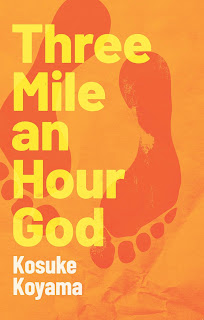I wasn't sure whether to read another set of theology books this year. Could the time I spend on it be better spent on something else? At what point does it become reading for the sake of it, without having much impact on my wider life? It's difficult to tell.
However, as usual, I had a growing list of books I wanted to read. I do need to think about what I'm doing as well as what I'm reading, and I don't expect to continue this specific discipline indefinitely. But I decided there was space for at least one more year of Reading for Spiritual Formation.
So, without further soul-searching: The Books.
Three Mile an Hour God
Kosuke Koyama
Japanese theologians are few and far between; Christianity is still very much a niche religion in Japan. Kosuke Koyama was Japanese and appears to be both influential and accessible. Not every theologian is both! So I'm excited to read his recently republished book Three Mile an Hour God. It was originally written in 1979, and is a series of reflections based around the idea that God goes slowly. At walking pace, in fact. About three miles an hour.
The Interior Castle
St Teresa of Avila
This is a classic of the contemplative tradition. St Teresa of Avila was a 16th-century Spanish nun. She set up several new convents, and experienced visions and raptures which supported her faith. The Interior Castle speaks of the soul being like a castle with seven courts, with God in the central one. There have been many English translations of the book since it came out in 1588. This one by E. Allison Peers seems to be well-respected, and hopefully readable.
A Place at the Table: Faith, Hope and Hospitality
Miranda Harris and Jo Swinney
In 1983, Miranda and Peter Harris founded the Christian conservation charity A Rocha in Portugal. Gathering around a table for a meal was part of the charity's ethos, helped along by Miranda's hospitable nature. Her family kept telling her she should write a book about it, but they didn't think she had ever found time to.
Sadly, Miranda and two others died in a car crash in 2019. When her daughter Jo was clearing out her mum's study, she found a folder full of notes for the long-awaited book. Jo made it her mission to bring Miranda's book to print. A Place at the Table is the collaborative result. I'm looking forward to reading their reflections on conservation, hospitality, and the Christian faith.
The Twelve Steps of Humility and Pride and On Loving God
Bernard of Clairvaux
Born in 1090, Bernard of Clairvaux was highly influential in the church in the twelfth century. He was an abbot in the Cistercian order of monks, founding an abbey at Clairvaux in France, and travelling widely to help resolve disputes within the church. I don't know much about him or his writings, but if he's still being quoted a thousand years later, he must have something good to say.
At the Gates: Disability, Justice and the Churches
Naomi Lawson Jacobs and Emily Richardson
At the Gates is based on a decade of research by Naomi Lawson Jacobs. It shares stories from disabled Christians, who have often felt unheard and overlooked in churches, and calls for "justice, equality and access to churches for disabled Christians" (from Naomi's website). I expect this will be challenging but important reading.
As usual, I'll be reading these over an academic year, from September to July. I'll post a blog when I finish each book. Your thoughts are welcome!






Comments